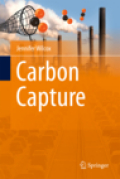
This book approaches the energy science sub-field carbon capture with an interdisciplinary discussion based upon fundamental chemical concepts ranging fromthermodynamics, combustion, kinetics, mass transfer, material properties, andthe relationship between the chemistry and process of carbon capture technologies. Energy science itself is a broad field that spans many disciplines -- policy, mathematics, physical chemistry, chemical engineering, geology, materials science and mineralogy -- and the author has selected the material, as well as end-of-chapter problems and policy discussions, that provide the necessary tools to interested students. First authored book on the fundamental aspects of carbon capture. First textbook on carbon capture. Covers a diverse range of issues, such as thermodynamics, kinetics, mass transfer, and material properties. INDICE: Power Systems (PCC, IGCC, NGCC, Oxycombustion).-Capture Systems (Postcombustion, precombustion, direct air capture). CO2 Chemistry (carbonate vs. carbomate); thermodynamics; kinetics. Mass Transfer (gas and liquid diffusion). Material Science - solvent properties; packing materials (absorption) - sorbent properties (MOFs, Resins, activated carbon; adsorption). Process Design (absorption towers; adsorption systems - packed-bed vs fluidized-bed reactors)- catalytic membranes - primarily for postcombustion. Precombustion capture methods - membranes (polymer and dense); zeolites.
- ISBN: 978-1-4614-2214-3
- Editorial: Springer New York
- Encuadernacion: Cartoné
- Páginas: 247
- Fecha Publicación: 31/01/2012
- Nº Volúmenes: 1
- Idioma: Inglés
